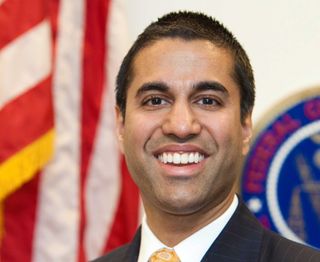Pai: Major Carrier(s) May Have Violated Mobility Mapping Rules

FCC chair Ajit Pai says one or more "major" telecom carriers may have violated the FCC's Mobility Fund Phase II reverse auction mapping rules and has suspended the process of handing out about $4.5 billion in subsidies pending an investigation he has just launched.
The chairman did not identify the carrier or carriers being investigated.
Carriers bid on how inexpensively they can provide mobile high-speed broadband service to areas without it, using government subsidies from the Universal Service Fund.
Related: FCC Will Widen Mobility Map Challenge Window
The investigation stemmed from a review of 20,809,503 speed tests filed with the agency.
Mobile carriers, who don't want government money spent to provide competing service, had to provide data on where areas were ineligible for the subsidy so the FCC could develop a map of those areas, but there was also a challenge process via which stakeholders could challenge the initial determination of ineligible areas.
Related: Senators Challenge FCC's Rural Broadband Map
Broadcasting & Cable Newsletter
The smarter way to stay on top of broadcasting and cable industry. Sign up below
“My top priority is bridging the digital divide and ensuring that Americans have access to digital opportunity regardless of where they live, and the FCC’s Mobility Fund Phase II program can play a key role in extending high-speed Internet access to rural areas across America,” Pai said in announcing the investigation. “In order to reach those areas, it’s critical that we know where access is and where it is not. A preliminary review of speed test data submitted through the challenge process suggested significant violations of the Commission’s rules. That’s why I’ve ordered an investigation into these matters. We must ensure that the data is accurate before we can proceed.”
Late last month, Sen. Joe Manchin (D-W.Va.), who was one of those challengers, told the FCC that the map overstates the availability of broadband coverage in his state.
The FCC put out the broadband map of areas eligible for Mobility Fund Phase II money over the next decade as part of its move to redirect wireless carrier subsidies away from where private capital was already at work bringing 4G LTE service to rural Americans who don’t have it today.
Contributing editor John Eggerton has been an editor and/or writer on media regulation, legislation and policy for over four decades, including covering the FCC, FTC, Congress, the major media trade associations, and the federal courts. In addition to Multichannel News and Broadcasting + Cable, his work has appeared in Radio World, TV Technology, TV Fax, This Week in Consumer Electronics, Variety and the Encyclopedia Britannica.

